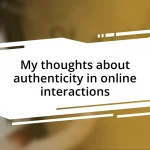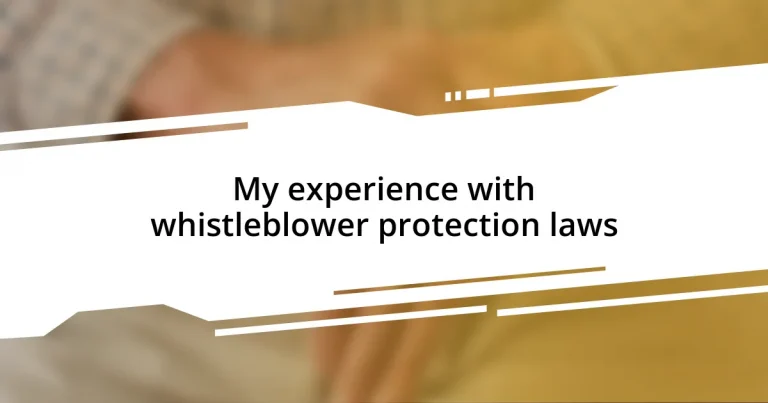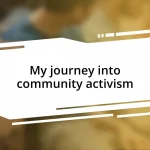Key takeaways:
- Whistleblower protection laws empower individuals to report wrongdoing without fear of retaliation, promoting accountability and transparency in organizations.
- Key legal frameworks, such as the Whistleblower Protection Act and Dodd-Frank Act, provide federal and state-specific protections for whistleblowers.
- Whistleblower laws not only shield individuals from retaliation but also encourage ethical reporting and can offer financial incentives, altering perceptions of whistleblowers as champions of justice.
- Common challenges include fear of retaliation, emotional toll, and navigating complex legal landscapes, emphasizing the need for supportive resources and educational opportunities for potential whistleblowers.
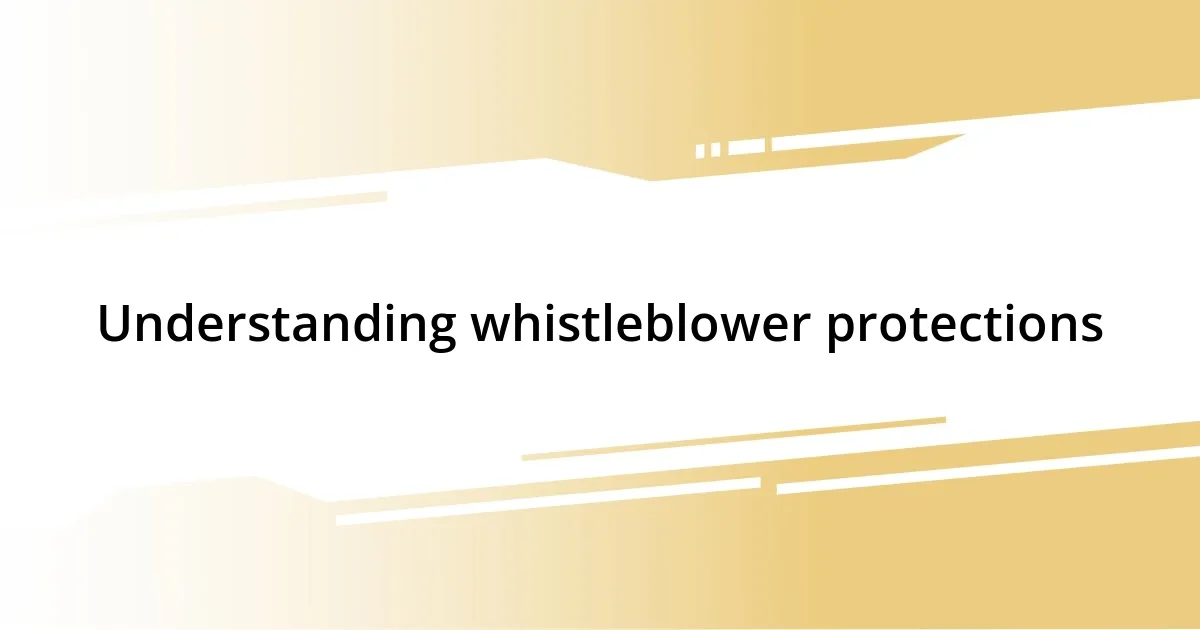
Understanding whistleblower protections
Whistleblower protection laws serve as vital safeguards for those who expose wrongdoing within organizations. I’ve seen firsthand how these laws can empower individuals to come forward without the fear of backlash. Have you ever felt that knot in your stomach from witnessing unethical behavior but hesitating to speak up? These protections are designed to alleviate that fear, creating a safer environment for transparency.
Navigating the landscape of whistleblower protections can feel daunting. I remember feeling overwhelmed by the complexities of these laws when I first considered reporting misconduct at my workplace. It’s crucial to understand that these laws not only protect whistleblowers from retaliation, like job loss or harassment, but also promote accountability in organizations. Isn’t it reassuring to know that there’s a framework to support those who act on their principles?
In my experience, the effectiveness of these protections often hinges on how well they are enforced. I’ve learned that simply having laws in place isn’t enough; organizations must cultivate a culture that values and respects reporting. When whistleblowers see their reports taken seriously, it reinforces their courage and encourages others to follow suit. How can we expect positive change without robust support systems in place? It’s a question worth pondering as we think about the future of ethical practices in the workplace.
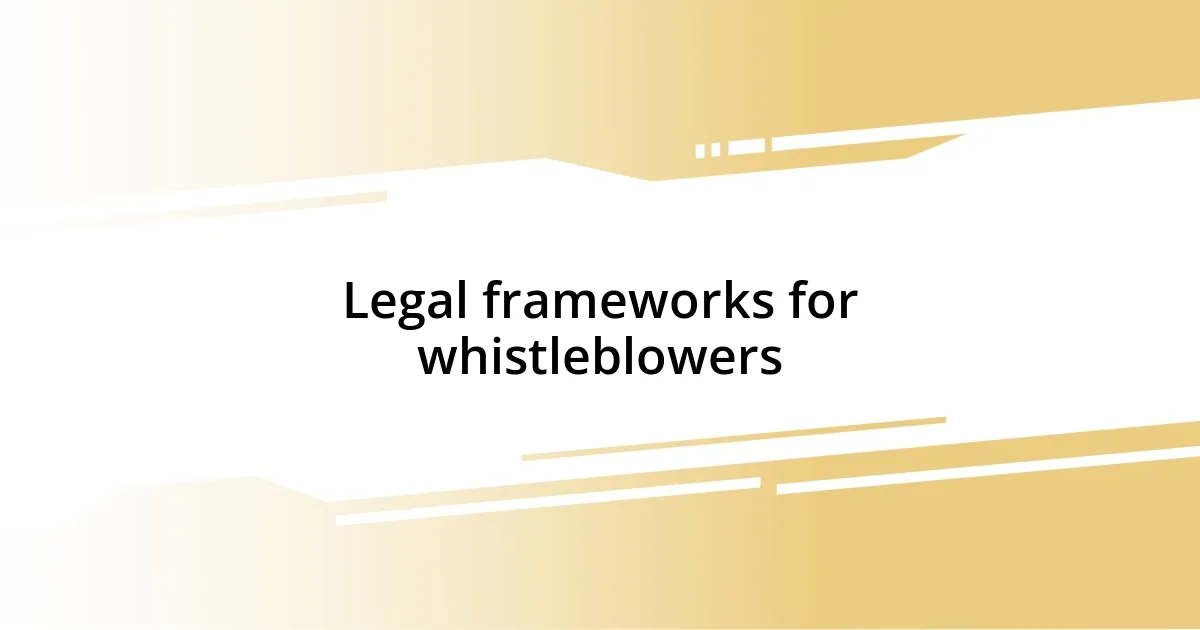
Legal frameworks for whistleblowers
I’ve often marveled at the variety of legal frameworks in place to protect whistleblowers, each tailored to specific industries and types of misconduct. For instance, I remember delving into the Sarbanes-Oxley Act, which was a game-changer for employees in publicly traded companies. Its strong protections against retaliation instilled a sense of security that was essential for many of us considering whether to speak out.
Here are some key legal frameworks that stand out:
- Whistleblower Protection Act (WPA): Federal law that shields federal employees from retaliation when reporting misconduct.
- Dodd-Frank Wall Street Reform and Consumer Protection Act: Encourages whistleblowing in the financial sector, offering monetary rewards.
- Occupational Safety and Health Administration (OSHA) Whistleblower Protection: Protects workers who report unsafe workplace conditions.
- State-specific laws: Many states have their own laws that provide additional protections, adding layers to the federal protections.
Understanding these frameworks is crucial; I learned this the hard way when I almost hesitated to report an ethical violation at my own job, feeling left in the dark about what laws were available to me. It’s empowering to know that there are various protective statutes designed with a clear purpose: to encourage people to uphold integrity and transparency in their workplaces.
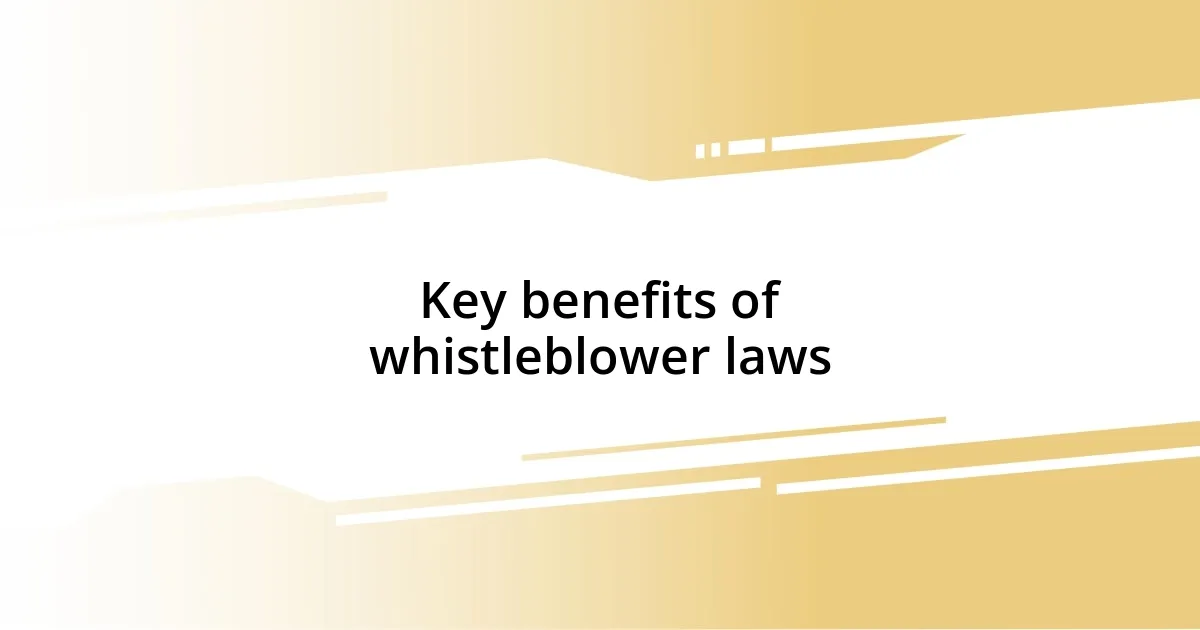
Key benefits of whistleblower laws
The key benefits of whistleblower laws extend beyond mere legal protections; they foster an environment that values honesty and accountability. When I first navigated a situation involving unethical practices, knowing there were laws in place made a significant difference. These laws not only shield individuals from retaliation, but they also encourage a culture of openness. Isn’t it fascinating how that sense of security can empower one to take action?
Additionally, whistleblower laws often come with incentives that can be life-changing. For example, I recall a case where a colleague reported financial discrepancies and received a monetary reward under the Dodd-Frank Act. This made me realize that whistleblowing can be not just a moral obligation but also a rewarding endeavor. The opportunity for recognition transforms the perception of whistleblowers from being mere “tattle-tales” to champions of justice.
Furthermore, the ripple effect of these protections is profound. In my own experience, when one person speaks out, it often encourages others to come forward with their own stories. I’ve witnessed how this can create a chorus of voices pushing for transparency within an organization. This shared courage is pivotal. How can we understate the importance of creating a supportive environment for those wanting to do the right thing?
| Benefit | Description |
|---|---|
| Protection Against Retaliation | Legal safeguards to prevent job loss or harassment for reporting misconduct. |
| Encouragement of Ethical Reporting | Fosters a culture that respects and values transparency, leading to more individuals stepping forward. |
| Financial Incentives | Opportunity for monetary rewards, making the act of whistleblowing not just a moral choice but financially beneficial. |
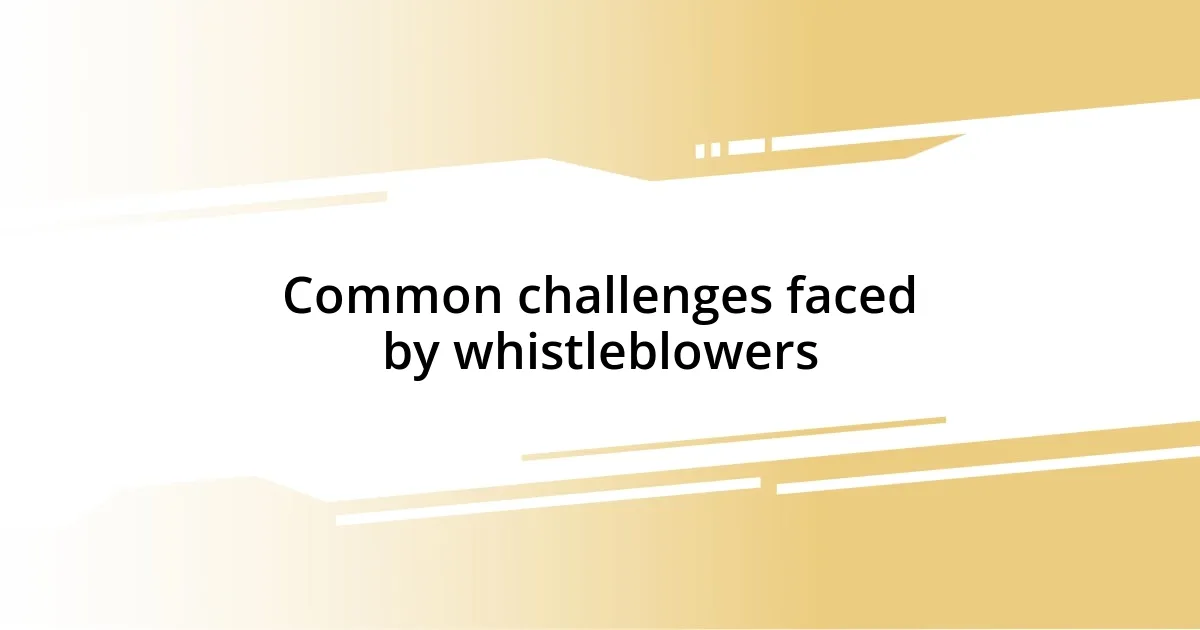
Common challenges faced by whistleblowers
One of the toughest challenges I observed whistleblowers facing is the fear of retaliation. I remember speaking with a friend who hesitated to report unsafe working conditions, expressing anxiety about being ostracized or even losing her job. This emotional turmoil is a common thread; many whistleblowers grapple with the decision daily. Isn’t it heartbreaking that doing the right thing can feel so perilous?
Another significant challenge is the emotional and psychological toll. After I blew the whistle on unethical practices in my workplace, I felt an overwhelming sense of isolation and stress. I noticed how the support systems around me began to wane, and the feelings of loneliness became almost unbearable. How can we expect those who step forward to speak out when the burden often falls squarely on their shoulders?
Lastly, navigating the complex legal landscape can seem daunting. If I hadn’t taken the time to educate myself about the protections available, I might have struggled to feel secure in my decision. It’s like trying to solve a puzzle without having all the pieces; the fear of making a mistake can deter potential whistleblowers from even starting. With so much at stake, how can we help demystify these laws and ensure that more people feel empowered to act?
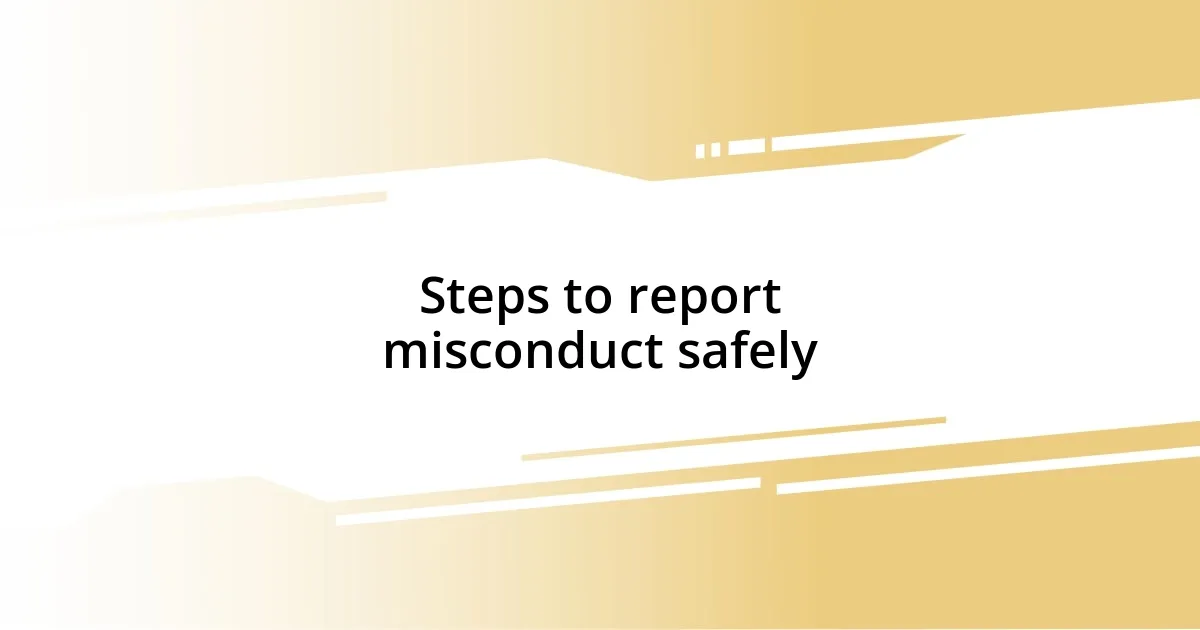
Steps to report misconduct safely
When you’re ready to report misconduct, the first step is to gather all relevant information. I remember the time I noticed discrepancies in financial reports; meticulously documenting everything—from dates to specific incidents—helped me build a strong case. Have you ever tried piecing together a puzzle? It’s that type of attention to detail that lays the groundwork for a solid report.
Next, consider the channels available for reporting. Many organizations have designated hotlines or ombudsman offices. I once called an anonymous hotline, feeling a mix of fear and relief, as I realized my identity would be protected. Understanding the right pathway can significantly reduce anxiety and ensure your concerns are heard effectively.
Before taking action, it’s crucial to understand the protections you have under whistleblower laws. Educating yourself about these legal safeguards can empower you to proceed with confidence. I found it reassuring to know that I wasn’t alone in my journey; there were laws to protect me from retaliation. Isn’t it comforting to realize that there are frameworks in place to support those willing to speak up?

Resources for whistleblowers seeking help
It’s essential for whistleblowers to know where to turn for support. I remember feeling completely lost after I reported unethical behavior; I stumbled upon a nonprofit organization dedicated to helping whistleblowers navigate the emotional and legal challenges. Their resources—from legal referrals to emotional support networks—were like a lifebelt thrown into turbulent waters. Have you ever felt like there was no one in your corner?
Another great option is to connect with local advocacy groups that specialize in whistleblower rights. When I joined a local chapter, I found a community of individuals who shared similar experiences, providing a sense of camaraderie that I desperately needed. These groups often offer workshops and training sessions, which not only educate you about your rights but also foster meaningful connections. How valuable is it to have a network of people who understand exactly what you’re going through?
Lastly, government agencies can be critical resources for whistleblowers seeking help. I reached out to the Office of Special Counsel, which provided me with crucial information on federal whistleblower protections. Knowing there are official channels that take your concerns seriously can be incredibly reassuring, right? With a supportive framework in place and clear resources at your disposal, you can feel more empowered to make that leap into the unknown.
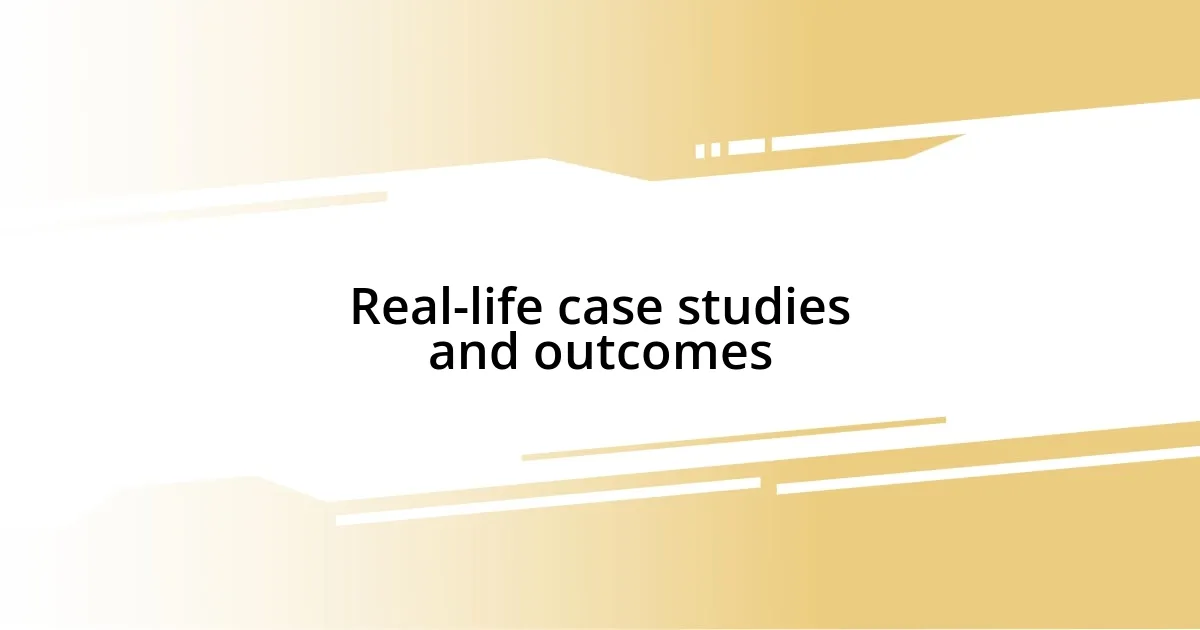
Real-life case studies and outcomes
When I think about real-life outcomes of whistleblowing, one case stands out to me: a healthcare worker who exposed safety violations in patient care. After reporting these issues, she faced immense pressure and backlash from colleagues. However, the law protected her, and she eventually received a settlement that not only compensated her for emotional distress but also led to the implementation of new safety protocols. Isn’t it amazing how standing up for what’s right can incite positive change?
Another instance that resonated with me involved a corporate employee who exposed fraudulent billing practices. Initially, he felt isolated, staring down the barrel of potential job loss. What he didn’t expect was the strong support he would receive from a national whistleblower organization. This group helped him navigate the legal landscape and ultimately resulted in a full reinstatement to his position, along with public acknowledgement of his bravery. Have you ever wondered how one person’s voice can ripple through an entire organization?
Lastly, I recall the story of an environmental engineer who reported toxic waste dumping at her company. Though she faced initial retaliation, her persistence led to an investigation that ultimately closed the facility and prevented further environmental damage. The outcome not only transformed her career but sparked a movement for more stringent regulations in the industry. Doesn’t it just highlight the power of whistleblowers as catalysts for broader societal change?








